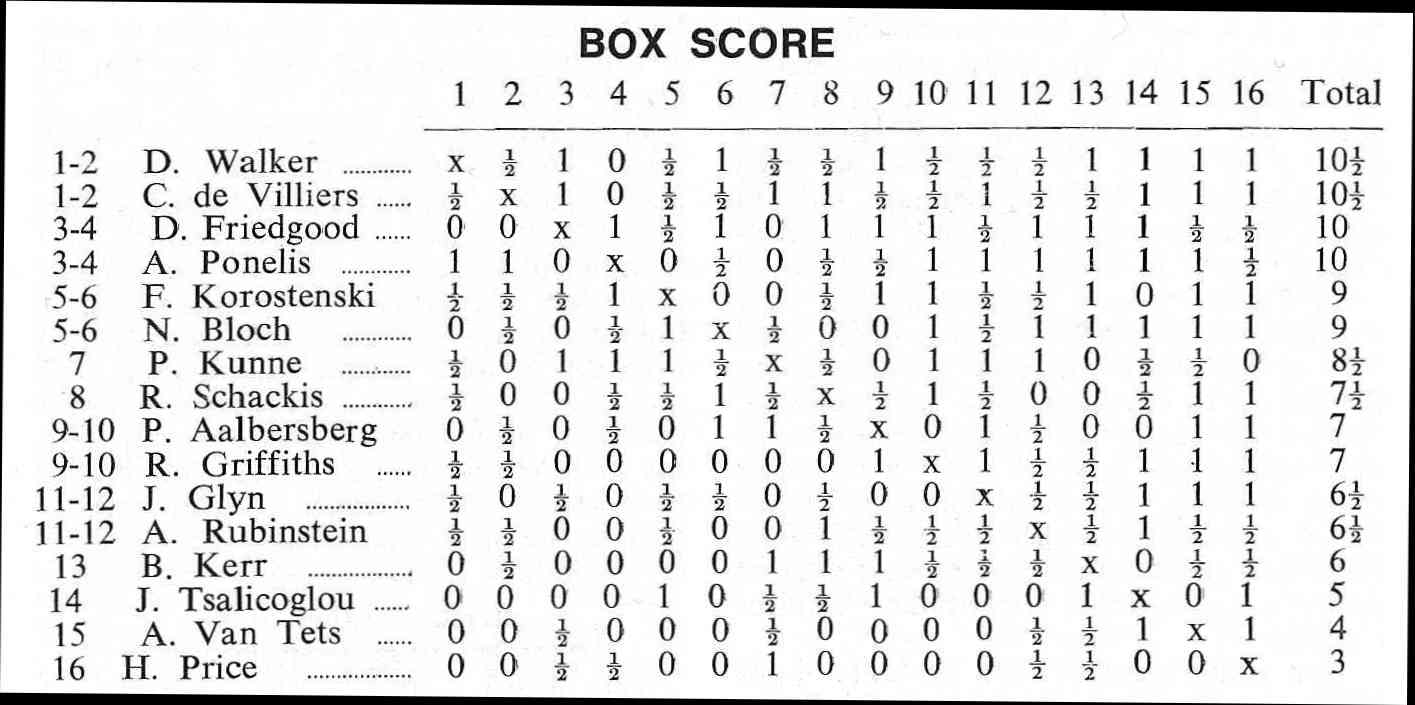
David Walker in 1977, with his Oudemeester trophy for player of the year |

|

David Walker in 1977, with his Oudemeester trophy for player of the year |

|
Although David Walker only won the Durban championship on three
occasions, from 1972 to 1974, he was widely considered as the best
player Durban had produced since the days of Jack Archer, who dominated
Durban chess in the 1930's. David's big year was 1977, when he became
only the second Durban born player to become South African Champion.
David joined the Durban Chess Club as a schoolboy in 1967, and
quickly made his mark. The following year he won the Natal Schools
championship and went on to finish 6th in the SA Schools championship.
After completing his schooling at Glenwood High School, where he was
the 1971 Dux, David commenced studying for his Bachelor of Science
degree at Natal University.
In 1972 David won the Durban championship with a picket fence 11 points
from 11 games! However, in 1973 he could only tie first with 7½ out of 10,
but subsequently defeated Gerald Boulle by 3-1 in a play-off match. David
went on to win the 1974 event comfortably, before being upstaged in 1975
by a resurgent Gerald Boulle.
In 1974 he also won the SA Junior championships, ahead of Andrew Murray, the 13-year
old chess prodigy Roger Schackis, Edmund Pfister (SA Schools champion), Orlando Santos
(Natal Schools champion) and B.Kaplan. His prize was the right to represent
South Africa in the World Junior championship, to be held in Hong Kong in 1975.
However, at the Nice Olympiad in July 1974, FIDE took the decision to suspend
South Africa and Rhodesia as members of FIDE, so the trip was off.
David moved to Cape Town in 1976 to work for Old Mutual, and subsequently
moved to the UK in 1995. Unfortunately he gave up competitive chess in
the early 90's before leaving South Africa. He is currently (2007) working
for a specialist IT company, providing managed Internet services.
David almost won the Natal Open and Closed titles as a schoolboy. At the
1971 event, he was the sole leader going into the last round and only
needed to draw with the White pieces against Grivainis in round 7.
Unfortunately his sharp opening backfired on him and he lost.
David won the Natal Closed title for the first and only time in 1972,
when he won the Natal Open outright. Since David became Cape domiciled
in 1976, he was not eligible for any further Closed titles. However,
he shared first place in the 1980 and 1983 Natal Opens, and won the
1982 event outright.
In 1972 David was a member of the South African students team that
competed in the World Student Team championship, held that year in
Graz, Austria. The South African team included Charles de Villiers,
Nigel Bloch, Albert Ponelis and Peter Sarnak, all very strong players.
Had it not been for politics, I am quite sure that both Walker and de
Villiers would have been awarded the International Master title.
David took part in the South African Closed championship on several
occasions, and wrote some instructive and entertaining reports for
the Club Bulletin about his experiences in 1973 and in 1975.
On his debut in 1971 David scored 5/13 (11th), followed by 4½/11 (17th)
in 1973. David made a big step up in 1975 when he came 4th with 10/15.
His best year was 1977, when he had a point lead going into the final
round. Knowing he had secured the SA Closed title David possibly relaxed
and lost to third placed man Ponelis in the last round. His final score
was 10½ (+7-1=7) so David shared the title jointly with 6-times RSA
champion Charles de Villiers. The box score is at the top of this page.
Here is a selection of games by Walker.
Game 1 is from 1971, against many-times Natal champion Moss Kolnik, and it
shows off David's early tactical talent.
David had an exceptional ability to calculate deep variations, and was
a very fine blitz player. Nevertheless this was a double-edged sword,
leading him into severe time trouble on many occasions, where even the
finest of blitz players was apt to spoil a "won game".
Game 2 was played in the Natal Blitz championship, held in February 1974
in Umkomaas. The time limit was 25 minutes per player per game. David won
with a clean score of 9/9, but it could easily have been different, with
Churton second on 7½ points.
Game 3 is from the last round of the 1982 Natal Open. Donald MacFarlane
was 2nd in the 1981 RSA Closed, and won the event in 1983, so he was a
most formidable opponent.